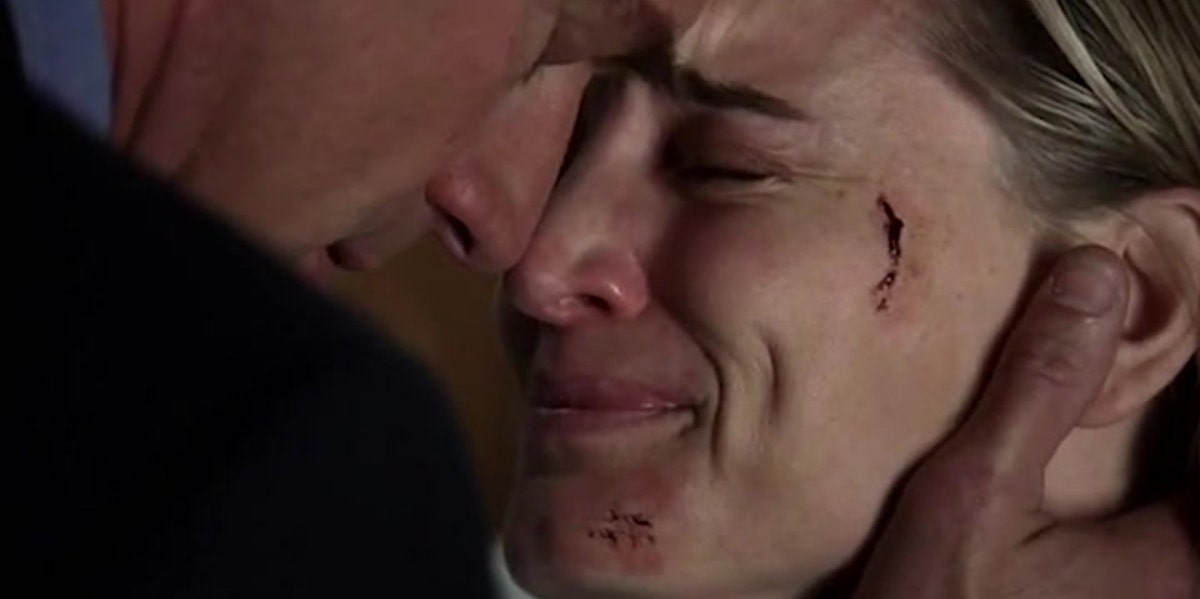What Is Fridging? 'Law & Order' Gave Us Another Unfortunate Example Of This Tired, Sexist Trope
Another one bites the dust, and it's not good for women.
 NBC
NBC The crossover premiere event for Christopher Meloni's Law & Order: Special Victims Unit spinoff provided an unfortunate example of a disturbingly toxic TV trope many hoped not to see again.
What is "fridging"?
In 1999, comic book writer Gail Simone first coined the term "women in refrigerators," a phrase that highlights the phenomenon of women being injured or killed for the furthering of a male plotline, rather than her own.
Named for a scene in the comic Green Lantern wherein the titular hero literally finds his girlfriend dead in a fridge, "fridging" remains as common as the appliance it's named for.
From Val (Thandie Newton) in Solo: A Star Wars Story to pretty much every Bond girl to that time Gwyneth Paltrow's head ended up in a box in Se7en, there has been no shortage of fridging female characters, even in recent years.
But that doesn't mean the most recent example of this sexist trope wasn't a particularly rough shock.
Spoilers for Law & Order: SVU and Law & Order: Organized Crime to follow.
During episode titled ""Return of the Prodigal Son," Kathy Stabler (Isabel Gillies), wife of Elliot Stabler and mother to his five children, dies after the couple's rental car explodes. Following a brief moment of stability and a quick monologue, Kathy succumbs to her injuries.
This all takes place in SVU, a show she first appeared on in its premiere episode, leaving Elliot a widower with a score to settle in Organized Crime.
Let's go over some of the things Kathy Stabler has been through in her time as a mostly ancillary character on Law & Order: SVU, serving even in her biggest episodes as only Elliot's wife:
1. She got pregnant at the age of 17.
2. Her husband joined the Marines, leaving her with an infant.
3. She went into premature labor when her husband was involved in a shoot-out.
4. She got separated from Elliot.
5. She got pregnant during a separation booty call with Elliot.
6. She gave birth to her separation booty call baby after a car accident where she had to be removed with the jaws of life.
7. She was held hostage by Cynthia Nixon.
8. She died of a ruptured spleen and didn't even get to appear in the spinoff! Rude!.
When female characters are relegated to "wife," or "girlfriend," or "daughter" with no autonomy or story outside of their relationship to the layered and nuanced Man Whose Story It Really Is, we all lose.
All too often, female characters exist only as some manner of sentient limb to the male character.
In an effort to give them something to do, some kind of gravitas, writers (usually male) give them a trauma to overcome — or not.
It's bad enough to reduce a female character to pure trauma, but it's made all the worse when said trauma is entirely a precursor to a male's storyline.
This can have real-world ramifications. How can women be seen as full people, whole on their own rather than side characters to their real-life male lead, when that representation is so limited?
Even SVU's chief "strong female character," Olivia Benson (Mariska Hargitay), has suffered more than enough for twice the show's 21 seasons.
She's experienced sexual assault and kidnapping, been held captive, her son was kidnapped, her son was kidnapped again — why can't our female characters just live their lives?
So much of Elliot Stabler's personal life strife was due to the traumatic act of having daughters.
His daughter who had boyfriends, got a DUI and was diagnosed with bipolar disorder — all in episodes that were about Elliot and his struggle with these things rather than about the character herself (Kathleen Stabler, I hope you don't go the way of your mother — you deserve better).
At its core, fridging makes one thing clear: to the creators of these shows, movies, comics, etc., at least, women are disposable.
I hope for better for our female characters.
Less trauma, less death, and for once less existence based purely on the men in their lives men.
Courtney Enlow is Editor of Pop Culture and Good News at YourTango. Her work has appeared at Vanity Fair, Glamour, Pajiba, SYFY FANGRRLS, Bustle, Huffington Post, io9, and others. She is the former co-host of Trends Like These with Travis McElroy and Brent Black. She has two kids, two dogs, and requires more wine, please.

